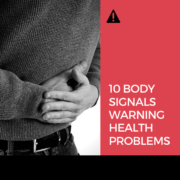10 Body Signals Warning Health Problems
Most often, we don’t worry about our health until we start to experience severe symptoms. Things like headaches, stomach aches, and fatigue have become too common that many people think they’re just normal. Well, most of the time they are. And even the healthiest individuals can suffer from occasional discomfort and pain.
However, we should always be aware of what our body is trying to tell us.
Below are 10 ways our body signals that we should be more concerned with our health:
Unexplained Weight Loss
Drastic weight loss is something to be worried about, especially if you haven’t changed anything in your diet. Most often, it indicates an underlying condition.
Health problems associated with unintentional weight loss are overactive thyroid, rheumatoid arthritis, diabetes, inflammatory bowel disease, chronic obstructive pulmonary disease (COPD), depression, endocarditis, tuberculosis, and cancer. As you can see, all these are chronic illnesses that require immediate and proper treatment. If you’ve lost more than 10 pounds without exercise or diet changes, it’s time to check in with your doctor.
Stomach Pain
You can have stomach pain for many reasons. Indigestion, allergies, or some bacterial infection are among the most common causes of abdominal pain. These symptoms can be addressed by taking either prescription or over-the-counter medications. And more importantly, by practicing proper hygiene like washing hands regularly or sanitizing surfaces with disinfecting wipes before use.
However, in some cases, stomach pain signals something more serious, such as a heart attack. Other symptoms to watch out for are nausea and heartburn. Meanwhile, “crampy” abdominal pain that is accompanied by bloating and diarrhea may signal irritable bowel syndrome (IBS).
Chest Discomfort
Chest pain is a major red flag that requires immediate medical attention. It’s a common symptom of a heart attack but it could also be caused by pancreatitis, pneumonia, panic attack, and many more health problems.
If you or someone you know suffers from chest pain along with nausea, shortness of breath, pain or numbness, lightheadedness or dizziness, sudden weakness, flushing or a cold sweat, call 911 immediately.
Skin Problems
You can have a quick assessment of your overall health just by looking at your skin.
Being the largest organ in the human body, the skin can tell a lot of things about our health. For instance, a skin rash that is accompanied by fever, joint pain, or muscle pain could indicate an internal problem or an infection. Yellowing of the skin could suggest liver failure while darkening of the skin, particularly on skin folds, could be a sign of hormonal disease.
Other skin problems that signal a need to check in with your doctor are:
Wrinkles
It’s common for older adults to have these. But deep forehead wrinkles could point to atherosclerosis which is the hardening of arteries – a risk factor for heart disease.
Breakouts
Acne is a common skin problem that can happen even in healthy individuals. But how do you know that it’s more than acne? If you haven’t had acne for a long time and you suddenly experience breakouts, it’s best to consult your doctor. Sometimes, it could indicate Polycystic Ovarian Syndrome (PCOS) or hormonal disorders.
Dryness
Dry and itchy skin could be a sign of a hormonal problem, such as an overactive thyroid. Meanwhile, people with autoimmune disease may suffer from swelling and hardening of the skin.
Weakness in the Arms and Legs
This symptom is due to loss of muscle strength, which can be caused by different health problems. Weakness, which also comes in the form of weariness, tiredness, lack of energy, or fatigue could be a sign of underlying illnesses like congenital myopathies, electrolyte imbalances, malnutrition, malignant tumors, nerve impingement.
Fluctuation in Body Temperature
The normal body temperature is 98.6°F (37°C) ± 1°. It’s common to go past this reading when you have a fever. Also, minor fluctuations are normal and can be attributed to environmental factors. However, excessive fluctuations in body temperature could signal more serious conditions, such as hypothyroidism, adrenal fatigue, septicemia (a type of bacterial infection), and altered insulin activity.
Sleep Issues
Common conditions associated with sleep problems are heart failure, musculoskeletal disorders, kidney disease, and thyroid disease. Insomnia is also a common symptom of mental health disorders like general anxiety, phobias and panic attacks, bipolar disorder, depression, and schizophrenia.
Moreover, certain brain and nerve disorders like dementia and Parkinson’s disease can all cause sleeplessness.
Bathroom Problems
People with type 2 diabetes have bodies that are less efficient at breaking down food into sugar. As a defense mechanism, the body will try to eliminate the sugar by flushing it out into the urine. If you experience more frequent trips to the bathroom (and feel thirsty more often), consider undergoing a blood test to know your average blood glucose level. The sooner diabetes is diagnosed, the easier it is to reverse through proper lifestyle changes.
Chapped Lips
If you can’t live without applying lip balm, it’s your body’s way of telling you that something is wrong. Dry, chapped lips are a common cause of vitamin deficiency. Consult your doctor for some lab tests and switch to a more balanced diet to make sure you’re getting the nutrients your body needs.
Cloudy Mind
Do you feel ‘lost’ lately? Are you unable to solve simple problems or formulate a potent thought? Cognitive and physical health are intertwined. Just as cognitive problems can result in some physical symptoms, physical illness can also affect our cognitive abilities. Obesity, for example, can significantly impact one’s ability to think and reason.
Chronic health problems usually start with minor symptoms. It’s best to consult your physician for any of your health concerns.

Mariam N. is a cleaning expert working with Sono Supplies. She has been interested in health and cleaning issues since she was young and wants to share her knowledge and experience with others who are not indifferent to cleanup. Mariam is deeply convinced that house cleaning is a critical part of hygiene. On a regular basis, she delivers new cleaning expert advice on how to treat products, tools, different items, which sometimes include medical instruments and equipment as well.










